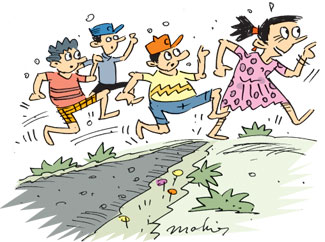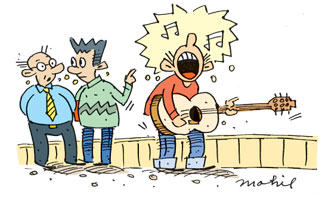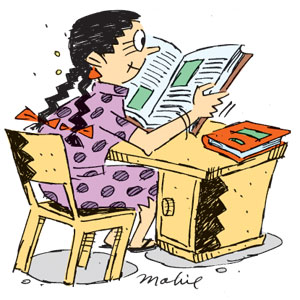|

by R. S. Karunaratne
Use of preposition 'above'
and 'over'
The preposition 'above' means 'higher than'. The meaning is very
close to the preposition 'over'. 'Below and 'beneath' are its opposits.
There was a name board above the house number.
Soon our plane got above the clouds.
Raining started first above the hills.
|

The children ran over the road to meet their parents |
Samson lived in a mansion above the village.
Sunil's performance was above average.
The mountain is about 1,500 metres above sea level.
'Above' can be used metaphorically.
Caesar's wife was above suspicion.
I found the new subject 'Metaphysics' above me!
'Above' can be used as a noun modifier.
The above figures show that the consumption of liquor has gone up.
'Above' can also postmodify a noun.
Sara was living in the room above but I could not meet her.
'Above' is usually not used with numbers. Use 'over' instead.
You cannot vote unless you are over 18.
A standard laptop will cost over Rs. 50,000.
As a preposition 'over' refers to movement at a higher level.
The birds flew over the paddy fields.
The children hung the balloons over the furniture.
Sometimes, 'over' can mean 'across.'
The children ran over the road to meet their parents.
We use 'over' when we cover something with something else.
Put a cloth over the food because there are a lot of flies around.
We also use 'over' when something is covering a vast area.
They have branches all over the island.
Sometimes, 'over' is used to refer to extended periods of time.
It has been raining over the past few weeks.
'Over' has a meaning of 'more than' a particular number.
|

Sunilís performance was above average. |
Her father must be over 70.
He was caught driving over the speed limit.
Mary earns well over Rs. 100,000 a month.
'Over' can be used as an adverb when there is a movement above
something or someone.
The huge bird flew over the child.
We use 'over' to indicate the end of something.
The exam is over, at last!
In informal situations we can use 'over' in the following ways.
Come and sit over here.
I'm going over to aunt Greta in the evening.
Go straight along this road and you will see a temple over to the
left.
'Over' is used as a prefix. Then it refers to something in excess.
Some employees have been overpaid by the cashier.
The lecturer's approach to the topic was over elaborated.
Current English usage
English is a living language and its words, phrases and clauses are
subject to change from time to time. Be familiar with the current usage
of the language.
1. Diarrhoea is spelt with the 'rrh' combination and the 'oea'
combination. It means a very loose bowel movement.
2. Dietician and dietitian
Both spellings are acceptable in modern English. The word means 'a
person who specialises in the principles of nutrition'.
3. Different from or different to
In formal English different from is more correct than different to.
Your lifestyle is different from mine.
However, different to is used in informal English.
His view of success is different to mine.
Different than is American English.
4. Dilapidated is frequently misspelt. Note 'Di' at the beginning and
the middle 'd'.
5. Dilemma is frequently misused. It refers to a situation in which
you are faced with two or more equally undesirable possibilities.
6. Dinghy and Dingy
Dinghy is a small boat. Dingy means 'gloomy'.
7. Dinner, lunch, supper Those who have their main meal in the
evening call it dinner. The midday meal is usually called lunch. Supper
has two meanings. If it is the main meal in the evening, it is a synonym
for dinner.
A light snack taken before going to bed is also known as supper.
8. Diphtheria is spelt with the 'phth' combination. It refers to a
type of infectious disease.
9. Disabled should be avoided. Diifferently- abled is preferable.
10. Disadvantaged and Disadvantageous Disadvantaged means 'not having
the standard of living! Disadvantaged people are living in rural areas.
Disadvantageous means 'causing a disadvantage'.
Retired people sometimes find themselves in a disadvantageous
position.
11. Disappoint has double 'p' and single 's'.
12. Disastrous has no 'e' after 't', although it is derived from
disaster.
13. Discover and invent
Discover is to find something that is already in existence. Invent
means to create something that has never existed before."
Columbusdiscovered America.
Alexander Graham Bell invented the telephone.
Use of article 'the'
with singular nouns
'The' is used when a person, an animal, a plant, a place or a thing
is mentioned for the second time.
Susila borrowed a book from the library.Now she is reading the book.
I was not well and went to see a doctor.However, the doctor had gone
a broad.
One day a dog started following me.I stopped the dog started barking
at me.
Plant a tree today. Tomorrow the tree will give you shelter.
'The' is used when it is clear to the listener or reader which
person, animal, plant, place or thing you are referring to.
The judge warned the accused and discharged him.
|

Susila borrowed a book from the library.Now she is reading the
book.
|
Can I use the bathroom?
The doctor advised me to exercise daily.
The teacher did not turn up to teach history.
Beware of the dog.
The bank is opposite the police station.
'The' is used when there is only one such thing.
The earth goes round the Sun.
I met a man who is sailing around the world.
'The' is used before ordinal numbers.
They live on the second floor.
Her birthday is on the 14th of August.
Neil Armstrong was the first man to set foot on the moon.
Note: An ordinal number shows the position of something in a line of
items.
Activity
Fill in the blanks with 'a, an', or 'the'. Check your answers with
the key.
1. There is ..... monkey on my roof.
2. ...... sky is covered with dark clouds.
3. Don't block ...... entrance.
4. My sister plays ...... violin well.
5. There is ...... supermarket on Main Street.
6. Be careful! There's ...... dog at the gate.
7. Sama bought ...... umbrella.
8. Would you like ...... ice cube in your drink?
9. Mother uses ...... apron when she cooks.
10. My father works in ...... bank.
******
[Key]
1. a 2. The 3. the 4. the 5. a
6. a 7. an 8. an 9. an 10.a
******
-------
Spelling rules
Most of the nouns ending in 'o' add '-es' for the plural.
Hero: heroes
negro: negroes
potato: potatoes
tomato: tomatoes
The following are some of the exceptions:
dynamo: dynamos
magneto: magnetos
photo: photos
piano: pianos
stylo: stylos
bravado: bravados
cameo: cameos
folio: folios
ghetto: ghettos
inferno: infernos
Manifesto: manifestos
Romeo: Romeos
There is a small collection of nouns that have only one form for both
singular and plural.
aircraft, deer, forceps, salmon, sheep, swine, grouse (bird)
Some nouns have no singular form.
alms, eaves, measles, news, riches,tidings, athletics, mathematics,
politics (these plural nouns often take a singular verb).
Some nouns describing single things take plural verbs.
bellows, breeches, pants, pincers, pliers, scissors, shears, tongs,
trousers.
When you use a 'pair of' before the above nouns, the verb should be
singular.
Some nouns do not take 's' for the plural forms.
man: men
woman: women
child: children
brother: brethren
penny: pence
ox: oxen
foot: feet
tooth: teeth
louse: lice
mouse: mice
goose: geese
terminus: termini
bureau: bureaux
index: indices
crisis: crises
Here are some common foreign plurals:.
Addendum: addenda
analysis: analyses
appendix: appendices
automation: automata
axis: axes
basis: bases
criterion: criteria
datum: data
erratum: errata
focus: foci
formula: formulae
fungus: fungi
hypothesis: hypotheses
index: indices
larva: larvae
libretto: libretti
maximum: maxima
memorandum: memoranda
minimum: minima
nebula: nebulae
nucleus: nuclei
oasis: oases
parenthesis: parentheses
phenomenon: phoneme
plateau: plateaux
radius: radii
sanatorium: sanatoria
spectrum: spectra
stimulus: stimuli
stratum: strata
synopsis: synopses
terminus: termii
thesis: theses
The final double '-ll' of a word used to form a compound, becomes a
single 'l'.
all: almost, alone, already, almighty, altogether, always
full: beautiful, careful, tactful, hopeful, fulfil, fulsome.
still: distil, instil
till: until
well: welcome, welfare
Exceptions: well-being, well-nigh, farewell
The following words also keep the double '-ll'.
nightfall, pitfall, waterfall, snowball, recall, install, pell-mell,
misspell, retell, foretell, undersell, windmill, kill-joy, all-knowing.
Words with the suffix '-or'.
curator, horror, motor, purveyor, senior, terror, tremor,
Some words have the suffix
'-our'.
clamour, colour, honour, humour, odour, saviour, vapour,
Some words ending in '-our' drop the 'u' when adding a suffix.
honour: honorary
humour: humorist, humorous
vigour: vigorous
Some verbs ending in '-se' take
'-'ce' for the noun form.
advise: advice
devise: device
license: licence
practise: practice
Most words derived from Latin initiatives ending in 'are' have
'able'.
Latin: applicare (English: applicable)
Latin: educare (English: educable)
Latin: excitare (English: excitable)
Latin: suparare (English: insuperable)
Latin: vulnerare (English: vulnerable.)
Some words derived from Latin infinitives ending in 'ere' have 'ible':
Latin: accedere (English: accessible)
Latin: comprehendare (English: comprehensible)
Latin: contemnere (English: contemptible)
Latin: dividere (English: divisible)
Latin: fallere (English: fallible)
To be continued |

